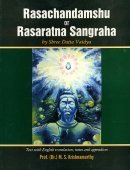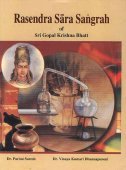Mandura, Maṇḍūra, Mandurā, Mamdura: 16 definitions
Introduction:
Mandura means something in Hinduism, Sanskrit, Marathi, Jainism, Prakrit. If you want to know the exact meaning, history, etymology or English translation of this term then check out the descriptions on this page. Add your comment or reference to a book if you want to contribute to this summary article.
In Hinduism
Ayurveda (science of life)
Rasashastra (Alchemy and Herbo-Mineral preparations)
Source: Wisdom Library: Rasa-śāstraMaṇḍūra (मण्डूर) or Maṇḍūralauha is the name of an Ayurvedic recipe defined in the fifth volume of the Rasajalanidhi (chapter 10, Śūla: pain in the belly). These remedies are classified as Iatrochemistry and form part of the ancient Indian science known as Rasaśāstra (medical alchemy). However, since it is an ayurveda treatment it should be taken with caution and in accordance with rules laid down in the texts.
Accordingly, when using such recipes (e.g., maṇḍūra-lauha): “the minerals (uparasa), poisons (viṣa), and other drugs (except herbs), referred to as ingredients of medicines, are to be duly purified and incinerated, as the case may be, in accordance with the processes laid out in the texts.” (see introduction to Iatro chemical medicines)
Source: PMC: Therapeutic potentials of metals in ancient IndiaMandura, the second form of Iron (loha/ayasa), has been used for a wide range of therapeutic procedures in classical Ayurveda since antiquity. It is defined by Madhava Upadhyaya in the Ayurveda Prakasha as the debris collected after heating and beating processes of Iron around a blacksmith's anvil. Generally, mandura is collected from sources like old anvils, and is considered to be very useful, if they are about 100 years old. Samples of ages 80 years and 60 years old are respectively considered moderately and least efficacious for therapeutic purposes. According to the literature Mandura, which is smooth to touch (Snigdha / Masruna), heavy (Guru), strong (Dridham), without any fissures or furrows (Kotaravarjitam), and taken from age old constructions (Jirna nasta purastham) is genuine and can be used for therapeutic purposes. Purified mandura, when administered with proper justification is beneficial in inflammations, edematous conditions, jaundice etc. It is the drug of choice in cases of anaemia (Pandu), and Charaka refers to a number of its preparations.

Āyurveda (आयुर्वेद, ayurveda) is a branch of Indian science dealing with medicine, herbalism, taxology, anatomy, surgery, alchemy and related topics. Traditional practice of Āyurveda in ancient India dates back to at least the first millenium BC. Literature is commonly written in Sanskrit using various poetic metres.
Languages of India and abroad
Marathi-English dictionary
Source: DDSA: The Molesworth Marathi and English Dictionarymaṇḍūra (मंडूर).—m S Rust of iron, or a medicinal preparation of it.
Source: DDSA: The Aryabhusan school dictionary, Marathi-Englishmaṇḍūra (मंडूर).—m Rust of iron, or a medicinal preparation of it.
Marathi is an Indo-European language having over 70 million native speakers people in (predominantly) Maharashtra India. Marathi, like many other Indo-Aryan languages, evolved from early forms of Prakrit, which itself is a subset of Sanskrit, one of the most ancient languages of the world.
Sanskrit dictionary
Source: DDSA: The practical Sanskrit-English dictionaryMaṇḍūra (मण्डूर).—Rust of iron, dross (used as a tonic).
Derivable forms: maṇḍūram (मण्डूरम्).
--- OR ---
Mandurā (मन्दुरा).—[mand urac Uṇādi-sūtra 1.38]
1) A stable for horses, a stable in general; प्रभ्रष्टोऽयं प्लवङ्गः प्रविशति नृपतेर्मन्दिरं मन्दुरायाः (prabhraṣṭo'yaṃ plavaṅgaḥ praviśati nṛpatermandiraṃ mandurāyāḥ) Ratnāvalī 2.2; R.16.41; क्षुराञ्चलैः क्षोभितमन्दुरोदरम् (kṣurāñcalaiḥ kṣobhitamandurodaram) N.; मन्दुरायां निरुद्धोऽपि विद्रुतोऽभूद्धरिर्हरेः (mandurāyāṃ niruddho'pi vidruto'bhūddharirhareḥ) Śiva B.21.74.
2) A bed, mattress.
Source: Cologne Digital Sanskrit Dictionaries: Shabda-Sagara Sanskrit-English DictionaryMaṇḍūra (मण्डूर).—mn.
(-raḥ-raṃ) Rust of iron used as a medicine. E. maḍi to adorn, ūrac aff.
--- OR ---
Mandurā (मन्दुरा).—f.
(-rā) 1. A stable. 2. A bed, a mat used as one. E. madi to please, &c. Unadi aff. urac .
Source: Cologne Digital Sanskrit Dictionaries: Benfey Sanskrit-English DictionaryMaṇḍūra (मण्डूर).—m. and n. Rust of iron.
--- OR ---
Mandurā (मन्दुरा).—f. A stable for horses, Weber, Ind. St. iii. 370, 14.
Source: Cologne Digital Sanskrit Dictionaries: Cappeller Sanskrit-English DictionaryMaṇḍūra (मण्डूर).—[substantive] rust of iron.
--- OR ---
Mandurā (मन्दुरा).—[feminine] horse-stable; pāla [masculine] groom.
Source: Cologne Digital Sanskrit Dictionaries: Monier-Williams Sanskrit-English Dictionary1) Maṇḍūra (मण्डूर):—n. rust of iron, [cf. Lexicographers, esp. such as amarasiṃha, halāyudha, hemacandra, etc.]
2) Mandura (मन्दुर):—[from mad] in [compound] = mandurā.
3) Mandurā (मन्दुरा):—[from mad] f. a stable for horses, [Kāvya literature; Rājataraṅgiṇī]
4) [v.s. ...] a mattress, sleeping-mat, bed, [cf. Lexicographers, esp. such as amarasiṃha, halāyudha, hemacandra, etc.]
Source: DDSA: The Molesworth Marathi and English Dictionary (Sanskrit)Maṇḍūra (मण्डूर) or Lohamaṇḍūra refers to the “rust of iron or a medicinal preparation from it”. Cf. Marathi lōhabhasma.
Source: Cologne Digital Sanskrit Dictionaries: Yates Sanskrit-English Dictionary1) Maṇḍūra (मण्डूर):—[(raḥ-rī)] 1. m. 3. f. Rust of iron.
2) Mandurā (मन्दुरा):—(rā) 1. f. A stable; a bed.
Source: DDSA: Paia-sadda-mahannavo; a comprehensive Prakrit Hindi dictionary (S)Mandurā (मन्दुरा) in the Sanskrit language is related to the Prakrit words: Maṃdurā, Vaṃdurā.
[Sanskrit to German]
Sanskrit, also spelled संस्कृतम् (saṃskṛtam), is an ancient language of India commonly seen as the grandmother of the Indo-European language family (even English!). Closely allied with Prakrit and Pali, Sanskrit is more exhaustive in both grammar and terms and has the most extensive collection of literature in the world, greatly surpassing its sister-languages Greek and Latin.
Prakrit-English dictionary
Source: DDSA: Paia-sadda-mahannavo; a comprehensive Prakrit Hindi dictionary1) Maṃḍūra (मंडूर) in the Prakrit language is related to the Sanskrit word: Maṇḍūka.
Maṃḍūra has the following synonyms: Maṃḍuga, Maṃḍūa, Maṃḍūka.
2) Maṃdurā (मंदुरा) also relates to the Sanskrit word: Mandurā.
Prakrit is an ancient language closely associated with both Pali and Sanskrit. Jain literature is often composed in this language or sub-dialects, such as the Agamas and their commentaries which are written in Ardhamagadhi and Maharashtri Prakrit. The earliest extant texts can be dated to as early as the 4th century BCE although core portions might be older.
Kannada-English dictionary
Source: Alar: Kannada-English corpusMaṃḍūra (ಮಂಡೂರ):—
1) [noun] the red or orange coating that forms on the surface of iron when exposed to air and moisture; iron rust.
2) [noun] a compound of ferrous oxide used earlier in preparing some medicines.
--- OR ---
Maṃdura (ಮಂದುರ):—[noun] a building in which horses are sheltered and fed; a stable.
Kannada is a Dravidian language (as opposed to the Indo-European language family) mainly spoken in the southwestern region of India.
See also (Relevant definitions)
Starts with: Mandurabhushana, Manduradhanika, Manduradhaniki, Manduraguda, Manduraja, Manduraka, Manduralauha, Mandurapala, Mandurapati, Manduravataka, Manturacinturam, Manturam.
Ends with: Akshamandura, Ashvamandura, Bharamandura, Catuhsamamandura, Gudamandura, Hamsamandura, Koladimandura, Kshiramandura, Lohamandura, Narayanimandura, Punarnavamandura, Purnavadimandura, Rasamandura, Shatavarimandura, Shataviryamandura, Takramandura, Tryushanadimandura, Vajramandura.
Full-text (+30): Manduraja, Dhaniki, Mandurabhushana, Mallura, Ashvamandura, Manduka, Mandurapala, Mandurapati, Lohabhasma, Mamdure, Mamdura, Mandu, Manduradhaniki, Irumputturu, Vamdura, Punarnavamandura, Mamdua, Mamduga, Kitta, Manturacinturam.
Relevant text
Search found 12 books and stories containing Mandura, Maṇḍūra, Mandurā, Mamdura, Maṃḍūra, Maṃdurā, Maṃdura; (plurals include: Manduras, Maṇḍūras, Mandurās, Mamduras, Maṃḍūras, Maṃdurās, Maṃduras). You can also click to the full overview containing English textual excerpts. Below are direct links for the most relevant articles:
Rasa Jala Nidhi, vol 3: Metals, Gems and other substances (by Bhudeb Mookerjee)
Part 18 - Iron variety (d): Mandura iron < [Chapter IV - Metals (4): Lauha (iron)]
Part 19 - Incineration of mandura < [Chapter IV - Metals (4): Lauha (iron)]
Part 20 - Use of mandura < [Chapter IV - Metals (4): Lauha (iron)]
Harshacharita (socio-cultural Study) (by Mrs. Nandita Sarmah)
5. Fauna (different types of animals) < [Chapter 7 - Environmental awareness and Hygiene Conciousness]
Part 9.2: Cavalry (aśvārohī): < [Chapter 5 - Political Aspects]
Part 5: Cultivation of Knowledge < [Chapter 3 - Education System]
Rig Veda (translation and commentary) (by H. H. Wilson)
Rig Veda 10.155.4 < [Sukta 155]
Rasa Jala Nidhi, vol 4: Iatrochemistry (by Bhudeb Mookerjee)
Part 31 - Treatment for indigestion (29): Badavagni rasa < [Chapter IV - Irregularity of the digesting heat]
Part 21 - Treatment of Piles (20): Astanga rasa < [Chapter V - Piles]
Part 14 - Treatment of Piles (13): Karunamaya rasa < [Chapter V - Piles]
Rasa Jala Nidhi, vol 5: Treatment of various afflictions (by Bhudeb Mookerjee)
Chapter 10 - Symptoms and treatment of Shula (pain in the belly)
Chapter 13 - Symptoms and treatment of Pandu (anemia) and Kamala (jaundice)
Chapter 8 - Symptoms and treatment of Amlapitta (acidity and biliousness)
Sushruta Samhita, Volume 6: Uttara-tantra (by Kaviraj Kunja Lal Bhishagratna)
Chapter XLIV - Symptoms and Treatment of Jaundice (Pandu-roga) < [Canto III - Kaya-chikitsa-tantra (internal medicine)]
Related products



